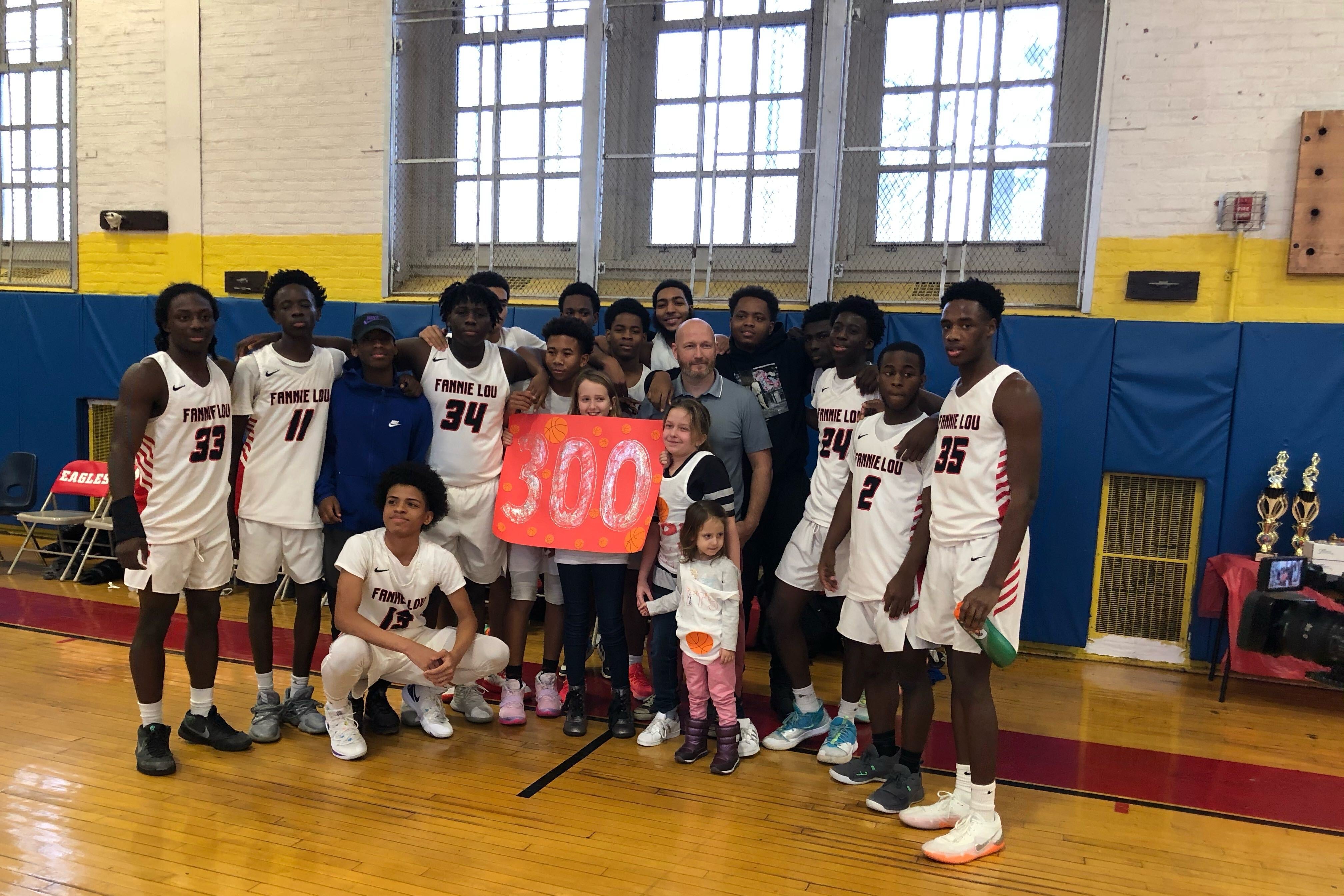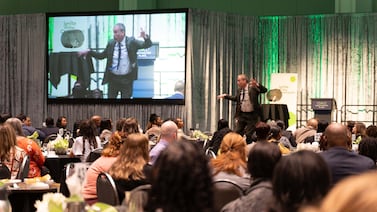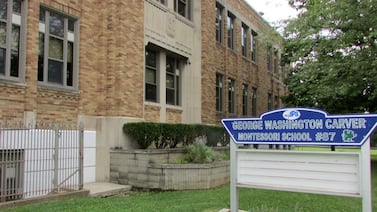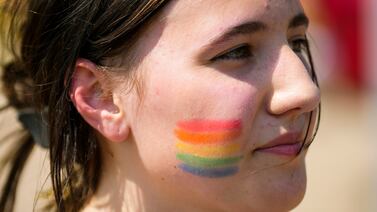This time last year, the boys basketball team at Fannie Lou Hamer Freedom School in the Bronx was working toward an undefeated season in their league and a spot at the citywide playoffs in New York City’s Public School Athletic League.
Their run was cut short when they lost a quarterfinals game by just one point, leaving players with the tantalizing thought that this year, the Panthers could win it all.
But the charismatic team and their coach haven’t played since last spring, when the coronavirus suddenly grabbed hold of New York City, forcing the country’s largest school system to shutter its school buildings and blow the whistle on its sports leagues. While some schools in the suburbs took to the fields this fall, New York City school athletic coaches have had their budgets zeroed-out.
Some 45,000 student athletes face a whole school year with no playing time. For many of these students, sports were the main reason they showed up to school. Without them, finding the motivation to show up for class can be a struggle — something that some New York City students fighting for equal access to sports teams have argued for years.
While the pandemic still rages, some coaches are trying to push the city to come up with alternative ideas, whether it be outdoor practices or virtual competitions, to help them reach student athletes before the year is over. Individual schools are also trying to find ways to create opportunities not only for physical activity but for the bonds forged through team competitions.
“I really miss the practices,” said Javin Trail, a senior at Fannie Lou. “It’s just a time we all get to hang out with each other.”
Last year, he earned playing time for the first time. Along the way, he forged deep friendships with his teammates on the court, during trips to games on the subway, and with celebratory slices of pizza after wins. This summer, he spent time perfecting his shots with his weaker, left hand in the hopes of winning a title. Now, Trail is juggling college applications while keeping up with his remote classes and wondering what this basketball season could have held.
“By the end of the season, we really built that bond of brotherhood. We really felt for each other. We really love each other,” he said. “I really worked hard on my game. I felt like this was really the year we were going to do something special, not only for the team, but for me individually.”
His coach, Marc Skelton, has led the Panthers for almost two decades. Last season, the team celebrated his 300th win. Skelton’s dedication, along with the player’s earnestness, landed them a profile in the New York Times in 2015.
“While losing a sports season in the bigger picture may not seem like a big deal, in the day-to-day, there’s pain. And for a lot of coaches I know, it’s depressing,” Skelton said. “A lot of players have worked their whole lives for this moment.”
Skelton said the Public School Athletic League, the governing body for New York City school sports teams, has largely been silent on what’s happening with athletic programs this year. He wished the league would come up with alternatives, saying coaches are ready and willing to step up.
“Sports are essential to a high school experience and now, without those, can we supplement it somehow, with something?” he asked. “There are a lot of coaches who want to do stuff and they have ideas to do things safely, but they just have no idea if they can.”
Not only have coaches been left with no guidance, they’ve also been left with no money, Skelton said.
Skelton also serves as his school’s athletic director, and when he logged into his account at the beginning of the school year, he found the balance was zero. A spokesperson for the education department said coaches are paid directly for their services — and since there have been no leagues, there’s nothing to be paid.
The Public School Athletic League had posted no information on its web site about the current school year until Dec. 22, after Chalkbeat inquired about the status of leagues this year. That note, however, provided little clarity.
“We hope to be able to come back to you soon with news about next steps for PSAL, depending on the health situation and data for the city,” it said.
New York City education department officials said “no final determination has been made” when it comes to scheduling the winter season. Looking ahead to the spring, officials said updated information will be provided “once in-person learning is available to high school students.” Middle and high schools shut down for in-person learning in November. There is no date set for those students to return, and with coronavirus rates rising across the city, it is looking increasingly difficult for buildings to reopen. Some high schools are now being used as vaccination hubs.
In the meantime, the state is clamping down on sports across New York. In early December, the state suspended winter sports championships and any “high-risk” leagues — including indoor sports like bowling and wrestling, as well as cheerleading, swimming, gymnastics, and others. Low- and moderate-risk sports can continue in the regular season, and championships are still scheduled for the spring.
In Centers for Disease Control and Prevention guidance on which activities pose the greatest risks of spreading COVID-19, competitions between teams from different geographic areas are listed as the riskiest. The American Academy of Pediatrics recently urged face masks for all indoor sports events, except swimming and diving.
Some places that have allowed school leagues to continue competing have seen an astounding number of coronavirus cases linked to athletes. Memphis, for example, saw 83% of positive cases among school communities tied to players and coaches. In other parts of the country, schools are grappling with how to address possible sports-related exposure to the virus. In Colorado, one school district plans to require student athletes to learn remotely so they don’t potentially expose their classmates to COVID-19 after competitions.
The pandemic has forced the Urban Dove charter network to rethink its entire model, which is centered on sports as a way to get their students — all of whom have struggled in traditional high schools and have fallen behind on credits — to make it to graduation. Students at the network’s schools in Brooklyn and the Bronx are placed in teams they learn with in the classroom and play with on the field. Everyone competes, and coaches work alongside teachers and social workers.
“Winning together, losing together, all these things can build these resiliency skills that students need,” said Jai Nanda, founder and executive director of the network.
Since it has become unsafe to play, the school has sent workout equipment like yoga mats and resistance bands to students’ apartments. Educators have found that an exercise session in the morning helps motivate the students to show up to class. There are still elements of the school’s philosophy that can’t be replaced, including the skills, camaraderie, and lessons learned through competition against other teams.
Coaches and teachers have tried to bring some competition to remote learning, with a virtual olympics and scavenger hunts that students can complete from their home, incorporating some physical activities like squats and pushups. At first, students were skeptical about the events, but they caught on quickly, and soon they were begging for the Zoom links to participate. It felt like a win for educators.
The bonds built through teamwork convinced Kiari Kirkland to keep showing up to his virtual classes. He and his classmates have spent the last three years together with Coach Daniel Miller. These steady, supportive bonds between classmates and coaches are an integral part of Urban Dove’s philosophy.
Kirkland, his classmates, and coach are all on a text chain where they encourage each other to get their classwork done. Kirkland wakes up and finds it’s like a motivational speech that might be delivered courtside, except sent to his phone.
“Remote learning definitely feels less motivating. But what’s motivating is coach Miller’s texts every morning,” Kirkland said. “Without those texts, I don’t think I would complete that work. It’s just very hard to do all that work at once.”
At Fannie Lou Hamer, sophomore KJ Lloyd called the Panther’s basketball team a “bridge way” to meeting many of his friends. It’s also, he hopes, a path to higher education. His dad, and some uncles and cousins, have all gone on to play college basketball. Lloyd is hoping he gets the same chance even after missing a season this year.
“With no basketball, no recruitment process, it’s going to be tough,” he said.
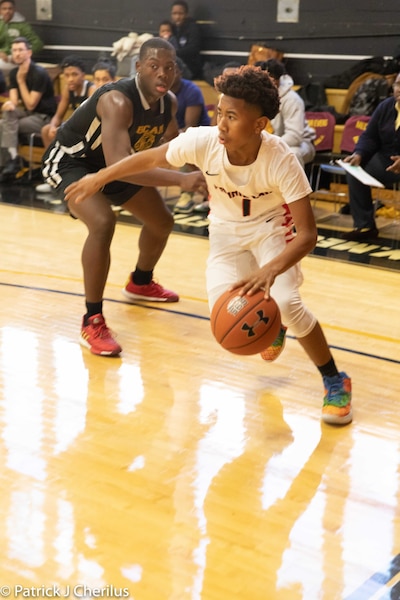
Some school districts have looked for other ways to get student athletes in front of recruiters this year. In Memphis, a series of “showcase” events were held for golf, soccer, volleyball, and other sports players.
While the school gym at Fannie Lou remains closed, Lloyd has been working out and playing scrimmages at a court in Brooklyn where his father works. He’s trying to stay on top of his game and also his grades.
Typically an A student, Lloyd won an award last year for his standout performance in class and on the court. This year, he’s working to pull his grades up in math, where his average has hovered around a C. Finding the motivation to log on for remote classes can be a challenge, especially without the promise of getting together with his teammates after school.
“The hard part is me figuring it out on my own. It’s a matter of me wanting to,” he said about his virtual lessons. “It’s just like, I have no basketball. I can’t go outside.”
He said: “It honestly sucks.”


